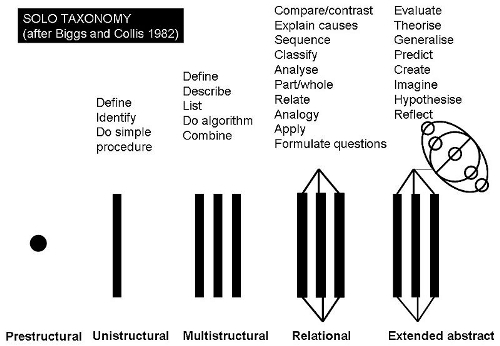SOLO TAXONOMY: AN APPROACH TO COACHING

Solo Taxonomy describes the level of increasing complexity in a student’s understanding of a subject, through five stages, and it is claimed to be applicable to any subject area. Not all students get through all five stages, of course, and indeed not all teaching (and even less training) is designed to take them all the way.
SOLO stands for:
Structure of
Observed
Learning
Outcomes
It was developed by Biggs and Collis (1982), and is well described in Biggs and Tang (2007).

Produced by Pam Hook (@arti_choke) http://pamhook.com/wiki/The_Learning_Process
Solo Taxonomy in Coaching
- Pre-structural: In this stage the coachee is simply acquiring bits of unconnected information, which have no organisation and make no sense to him. The coach has to avoid the urge to propose a solution. When coachees are in the pre-structural stage their belief in coaching may be weaker and they may drop out of the engagement early. Building trust and credibility is very critical at this stage.
- Unistructural: Simple and obvious connections are made, but their significance is not grasped. Coachees still do not know the solution for their challenges. The insight created by the coach can cause the coachee stress as the purpose is still unknown to them.
- Multistructural: A number of connections may be made, but the meta-connections between them are missed, as is their significance for the whole. All the insight created by coach remains independent of each other. A well-integrated neural pathway is yet to be created. Coachees may feel more confident. The success of the coaching engagement depends bringing connections to these independent insights.
- Relational level: The coachee is now able to appreciate the significance of the parts in relation to the whole. He is more motivated as the solution starts to make sense. More dopamine release (neurotransmitter related to novelty) is realised and probably insight is sustained.
- At the extended abstract level, the coachee is making connections not only within the given coaching area, but also beyond it. He would start self-sustaining. He should be able to generalise and transfer the principles and ideas underlying his learning. This is when coaching reaches completeness.

R.R Krishna is PCC, RPCC, CMC, CPC , CELC, EMNL with around 30 years of experience in people development. He is presently publishing his first book Prismatic Coaching – Getting to the heart of matter through self-directed coaching. Krishna is based out of Chennai in India. He has also established BRICMCC


